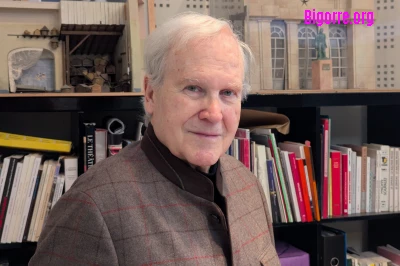How did you become the cultured man of today?
I was a kid raised in the countryside in the post-war years and who lacked everything. Books, entertainment. Who only heard about these things from a mother who was a little nostalgic and a little romantic about that, and who told me about things I never saw. School was my only place of fulfillment, and I must say this about mediocre teachers because they were dealing with village hicks. I didn't have the encounter—all things considered—that Camus had with his teacher. I tried to move forward in the dark night. My grandmother took me to see performances by roadside comedians who crisscrossed the countryside. That's where I received my first thrills from the performing arts, in front of things that probably had no artistic interest but nevertheless produced this kind of spark in me. Something happens under the sky that breaks with the daily grind you're stuck in.
Still far from culture then!
Another important element: I spent my entire childhood as a boarder. It was a radical break from my environment. Radical and salutary because it cut me off from sociological gravity, as Bourdieu would say. I suffered a lot and I was bored. And when you're bored, you read. And I read like autodidacts read: anything. Seneca as well as Bossuet's Sermons, Montaigne as well as Claude Farrère. And then I discovered something very quickly. Just by walking around with Bossuet's sermons in my hand, delivering them to see how they worked. All of a sudden, the teachers and some of the teachers were wondering what this bird was? And all of a sudden, I remembered my theater experience and said to myself, "You have to be original, you have to have something of your own. You have to cultivate something." These are the two matrices that produced my approach. All of this would come together when I was a junior. There was a theater troupe led by a philosophy teacher. And there I discovered the pleasure of theater, the pleasure of acting, of learning verses. And the friendship with a philosophy teacher that would later determine my direction, since I would become a philosophy teacher. I was hungry for culture. And two poles, philosophy and theater. Which would pose a problem for me later on.
And would you prefer to become a theater director rather than an actor, or to remain a philosophy teacher?
You become something, and you don't know why. But are you going to pursue a career in theater or in philosophy? I was torn throughout my student years, so much so that at one point I wrote a thesis on Antonin Artaud, the man who made theater impossible. I spent three years on Antonin Artaud's failure, which was the failure I wanted because I don't know if I had the courage to jump into the void and be an actor or a director. I saw a lot of things, Chéreau and all the others I saw growing up. I felt that if I wasn't at that level, it wasn't worth it. There are creators and transmitters. A teacher, a man of culture. People to whom something cultural has been transmitted who have the duty to transmit it. Both are necessary. A painter needs a gallery, a writer needs to be published. And I experienced the indispensable role we have had in the world of entertainment.
What was your idea behind founding the Parvis?
There was nothing like the Maisons de la Culture. I dealt with the disappointment of not having this kind of establishment where the things I loved most happened. And I did it with an entrepreneurial mentality. An entrepreneur is someone who is ready to risk everything for an idea they have. This was at the time of May '68. You had to get out of theaters, invent things, go into nature, go into factories to find the non-public. At the time, I was a philosophy professor and a theater lover, not really settled in my position. I married a girl who was in a family of Leclerc distributors. They talked about supermarkets and distribution. I saw that it worked, that there was a crazy crowd in these places. Very different people, a kind of reinvention of the social life of traditional markets. The people are there, the famous people we're trying to reach with culture.
It just had to be done!
I'm not giving up. I'm proposing a project to these family members, to bankers, to developers who were there around the table. And I was lucky enough to have a banker of a higher caliber who said yes, we'll finance it, let's do a project. It wasn't enough to say you like theater, that you like philosophy. I see that in the overall cost of an infrastructure like Le Méridien, you're going to spend a lot of money on usable square meters.
